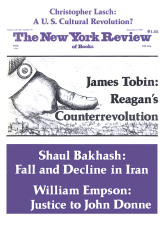In response to:
Who Wrote Thomas Wolfe's Last Novels? from the March 19, 1981 issue
To the Editors:
I respond to the letters of John Halberstadt [NYR, March 19] and Richard Kennedy [NYR, July 16] and Mr. Halberstadt’s reply [July 16]. I went to Harvard in 1968-1969 to examine the manuscript and found that it confirmed Kennedy’s view of the extent of Aswell’s “creative editing.” I could not, however, understand Kennedy’s conclusion that Aswell had done a first-class job and was justified in what he had done. This is above all a moral question. Wolfe had specifically left Scribners and Perkins because of unwarranted editorial interference, and he intended to produce unaided the Great American Novel. Ironically, his manuscript was subjected to much harsher treatment than Perkins had carried out of either Look Homeward, Angel or Of Time and the River. No other author has suffered in this way and on this scale. It is time to stop publishing editions which differ very substantially from the form intended by Wolfe.
In 1968-1969 I wrote to the leading American scholars on Wolfe and received replies from all except Kennedy. I phoned him and got the same response as Mr. Halberstadt. Kennedy told me that in not replying he was doing me a service—the project of a critical edition was totally unrealistic, and it was morally wrong to encourage me. He said he had my interests at heart. I also wrote to Harper and Row and asked if they would be interested in publishing a critical edition; they replied that it was not a “feasible project for a publishing house” such as theirs. I told Mr. Paul Gitlin, the executor, of this and received the reply, “in view of your unprofessional conduct in approaching publishers with such a project without the approval of the estate…I do not feel the material should be available for your further inspection.” This is the position today. No publisher or academic in England feels I behaved “unprofessionally.”
My own work on Wolfe was completed in 1972 when I provided a long critical introduction to the manuscript which appears to have been largely repeated by Mr. Halberstadt ten years later. My work can be found at the University of Nottingham, England.
While I regard Mr. Kennedy’s scholarship highly I feel his critical ability must be questioned. His position of satisfaction with Aswell’s “edition” is a nonsense, above all for the information he himself provided. Let me give one example. The published edition of YCGHA ends with a personal message from Webber to The Fox (i.e. Perkins) in which he says he has been told by “something” that he is to die; this high poetic note is false to the way Wolfe himself intended to end; he had come to artistic maturity away from Perkins and his editorial hand and the book’s final words to be of America and his firm conviction that though “we are lost here in America…we shall be found.” Wolfe believed Americans would recognize the situation and he intended the book to end with
Look about you and see what he (i.e. The Enemy) has done. Can anyone deny what he has done.
The first sentence of the quotation appears on the final page of the book (but not at the end) while the second is omitted. The emphasis and urgency intended by Wolfe has disappeared as a result of a) the shift of the material and b) the cutting of it.
How can critics comment significantly on the material if they are not able to refer to all of it; indeed may not even be aware of all of it. Of what use will Professor David Donald’s forthcoming biography be when it appears. He can quote chapter and verse but unless the material is available in its entirety, critics will not be able to decide if the balance of the book and the critical views expressed are acceptable.
There is a need for a complete critical edition of the manuscript—for Wolfe’s sake.
John Eldergill
International University
London, England
This Issue
December 3, 1981



